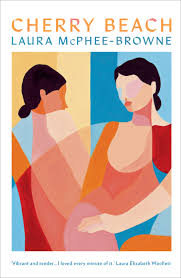Cherry Beach (Text Publishing 2020) is the debut novel by author Laura McPhee-Browne and will appeal to readers of Ronnie Scott (The Adversary), Madeleine Watts (The Inland Sea) and Luke Horton (The Fogging). This quite beautifully written, meditative, inward-looking, reflective story features twenty-somethings in that crucial stage of life, where adolescence is behind them but proper adulthood has yet to arrive. That liminal phase of searching for self-identity, exploring the world and trying to ‘find themselves’.
The two main protagonists Hetty and Ness have been best friends since childhood although in many ways they are very different. Hetty is outgoing, popular and attractive – a magnet for both men and women alike. Ness is quieter, more introspective, and less sure of herself. Ness has always been hopelessly in love with Hetty, first in an innocent childhood besties kind of way, and then – as she matures – in a proper, overwhelming feeling of yearning, desire and longing. But Hetty is oblivious, and Ness doesn’t want to do anything that might threaten their special friendship.
The book begins as the two young women arrive in Toronto from Melbourne to start their first adventure of living overseas. They move into a share house with a handful of other interesting characters, find work and develop relationships. Ness meets the ethereal Faith in an art gallery and they begin a passionate affair. Hetty falls prey to bad men and bad drugs, and her life begins to unravel.
The story follows their journey as they struggle to negotiate their lives, their work, their friendships, their romantic liaisons, and most of all, their long, childhood friendship, which despite everything else that’s going on, is still the deepest and most intense of bonds. Underneath the narrative are the themes of grief / loss and mental health, which are subtly included from the very start.
With minute introspection into the details and minutiae of everyday life, Cherry Beach is a slow and considered exploration of desire, loneliness, recklessness and tenderness. I actually enjoyed the second half of the book much more than the first – the pace picked up a little, and the stakes got a little higher, and McPhee Browne seemed to have found her rhythm; everything became clearer, more defined and of more consequence. I love the first section (not labelled a prologue but functioning as one), and I also loved the chapter titles, which are all names for bodies of water or sea/lake/river-related concepts. I also appreciated how the author handles the diversity of same-sex relationships – not highlighting them as an ‘issue’ but casually and seamlessly incorporating them into life; Ness’ relationships are central to the story but are not treated any differently to any other romantic attachments. This close interweaving of diversity into mainstream fiction is exactly like life, and just what we need from modern literature.

